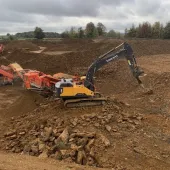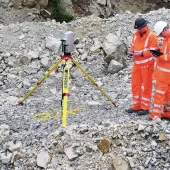MPA calls for reform of mineral planning system

Mineral Products Association says reforms are needed to ensure future supply of essential mineral products
THE Mineral Products Association (MPA) has today (10 June) published a policy paper calling for reform of the mineral planning system to ensure future supply to support housing and infrastructure construction, manufacturing and other key strategic sectors of the economy. The paper highlights the essential role of mineral products and the fundamental importance of the planning system for ensuring supply as the economy recovers.
Coming ahead of the Government’s anticipated Planning White Paper, the MPA calls for specific, deliverable measures to reinforce the essentiality of mineral products and improve delivery of the Government’s planning ambitions, supporting the recovery of construction and the wider economy.
Surveys by the MPA show that over a 10-year period, land-won aggregates consumption outstrips the new reserves that are permitted with 75% of crushed rock reserves and just 63% of sand and gravel reserves replaced between 2009 and 2018.
With the planning system having a key role to play in ensuring the right minerals are made available in the right place and at the right time to maintain the continuity of supply, the MPA believes the reforms proposed in its paper would substantially improve these processes.
It says the Government’s Planning White Paper will be an important step to support economic growth and recovery, providing an opportunity to reinforce the link between delivery of housing, commercial development and infrastructure and the critical need for a steady and adequate supply of essential mineral products for construction and manufacturing.
The MPA paper proposes a number of key reforms, both general to the whole system and specifically for mineral planning. General reforms include:
- Better resourcing planning functions by ring-fencing fees to address the chronic under-resourcing of local planning departments;
- Tackling slow plan-making and decision-making by streamlining the plan-making process, focusing on simpler plans supported by a template approach to general and development management policies that are common across the country; and
- Resisting the increasing number of superfluous information demands during plan-making and development control by ensuring information requirements are material, reasonable and genuinely necessary.
Reforms that are specific to mineral planning include:
- National statements of need for minerals and mineral products, including new national and sub-national guidelines for aggregates provision should provide a more consistent ‘forecast of future demand’ to support the development of local plans;
- Continued monitoring at both national and local scales to support function and delivery of the Managed Aggregate Supply System;
- Major construction projects should be required to produce ‘resource assessments and material supply audits’ as part of their development processes to provide greater visibility around future needs, and ensure the right materials are available in the right place and at the right time;
- Establishing regional ‘centres of excellence’ for mineral planning delivery, pooling resources to deliver mineral planning services across authorities to address the lack of specialist minerals planning skills and experience within planning departments;
- Establishing the primacy of the planning permission as the main ‘licence to operate’ to reduce the duplication with other regulatory regimes.
Nigel Jackson, chief executive of the MPA, said: ‘Our sector is responsible for the delivery of 1 million tonnes of essential minerals and mineral products flowing through the national economy every single day, enabling the construction of housing, hospitals and schools alongside transport and energy infrastructure and supporting manufacturing activity.
‘Our analysis estimates over 3 billion tonnes of construction aggregates alone will be required by 2030, of which 70% will be primary materials that will need to be dug from the ground or dredged from the seabed.
‘To maintain this essential contribution, supply cannot be assumed, it has to be planned, monitored and managed. New capacity cannot be simply ‘switched on’, as it can take up to 15 years to bring new minerals sites and reserves into production following extensive investment and planning.
‘The cumulative impacts of the ‘localist’ approach to mineral planning is a constraint on investment and confidence-building by creating so much uncertainty. Long-term societal demands therefore need to be supported by long-term policies and plans that provide confidence to planning authorities and mineral operators to ensure the most sustainable and cost-effective supply solutions can be delivered.
‘The forthcoming Planning White Paper provides an opportunity for the essential role minerals play in our economy to be recognized and supported.’
The MPA’s ‘Planning for the future’ policy paper can be downloaded below.









